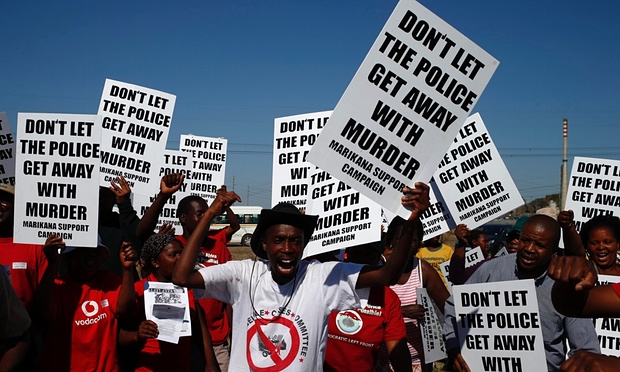Statement: Police fail to answer our questions on Marikana killers

Photo: Mike Hutchings/Reuters
It has been 60 days since R2K and the Marikana Support Campaign used the Promotion of Access to Information Act (PAIA) to demand SAPS reveals what steps it has taken in the past three years to act on its members’ wrongdoing at Marikana –and SAPS has still not provided any answers.
R2K and MSC first put in this request after the release of the Farlam Commission report. The initial 30-day deadline for a response was extended by another 30 days, at SAPS’s request. However, that deadline lapsed yesterday, and SAPS has not responded to the requests. SAPS is now claiming a further extension of the deadline using a technicality of the act, despite the extension they had already requested – and continues to refuse us answers. We condemn the abuse of technicalities in the act as a delaying tactic for providing information to the public.
The Promotion of Access to Information Act (PAIA) is a powerful tool on paper and allows anyone to request records from a public body or a private body, with a 30-day deadline for a response. In practice, however, PAIA is widely disregarded. In its 2012/13 annual report on the state’s compliance with PAIA, the South African Human Rights Commission revealed that 90% of municipalities fail to comply with the Act’s provisions. Furthermore, the PAIA Civil Society Network’s 2013/14 report showed more than half of requests to government departments were refused that year[1].
Why this information matters
Despite its shortcomings, the Farlam Commission found serious wrongdoing among police officers on the ground and made recommendation that these cases should be investigated for possible prosecution. This raises questions about what action, if any, the SAPS has taken in the three years since the massacre to act on this wrongdoing. R2K and MSC submitted a request in terms of PAIA to the SAPS for answers to these questions:
- Has the SAPS taken any steps to identify police members who may have exceeded the bounds of justifiable force at Scene 1 and Scene 2? If so, what?
- Has the SAPS initiated criminal investigations or disciplinary measures against any of these members?
- How many of the officers involved in the killing are still carrying firearms?
- Do any of the members of the SAPS who were involved in the killings at Marikana continue to serve in NIU, SDF, TRT or K9 units?
- Have any steps been taken to review the suitability and fitness of members of the SAPS who were involved in the killings at Marikana to continue serving in the SAPS?
- Have any steps been taken to assess the impact of participation in the events at Marikana on members of the SAPS who were involved?
The answers to these questions are essential to hold the SAPS to account, not only to the victims and families at Marikana, but to all in South Africa who need to trust the police.
If SAPS fails to give us answers, R2K and the Marikana Support Campaign will approach the Minister of Police, by lodging an internal appeal. We will continue to demand that this information is made public! The police must be held accountable for their actions at the Marikana massacre and in the days after!
[1 ]See PAIA CSN 2013/14 Report, 2 Feb 2015:
http://www.saha.org.za/news/2015/February/15_years_on_shadow_report_reveals_paia_compliance_remains_low.htm


